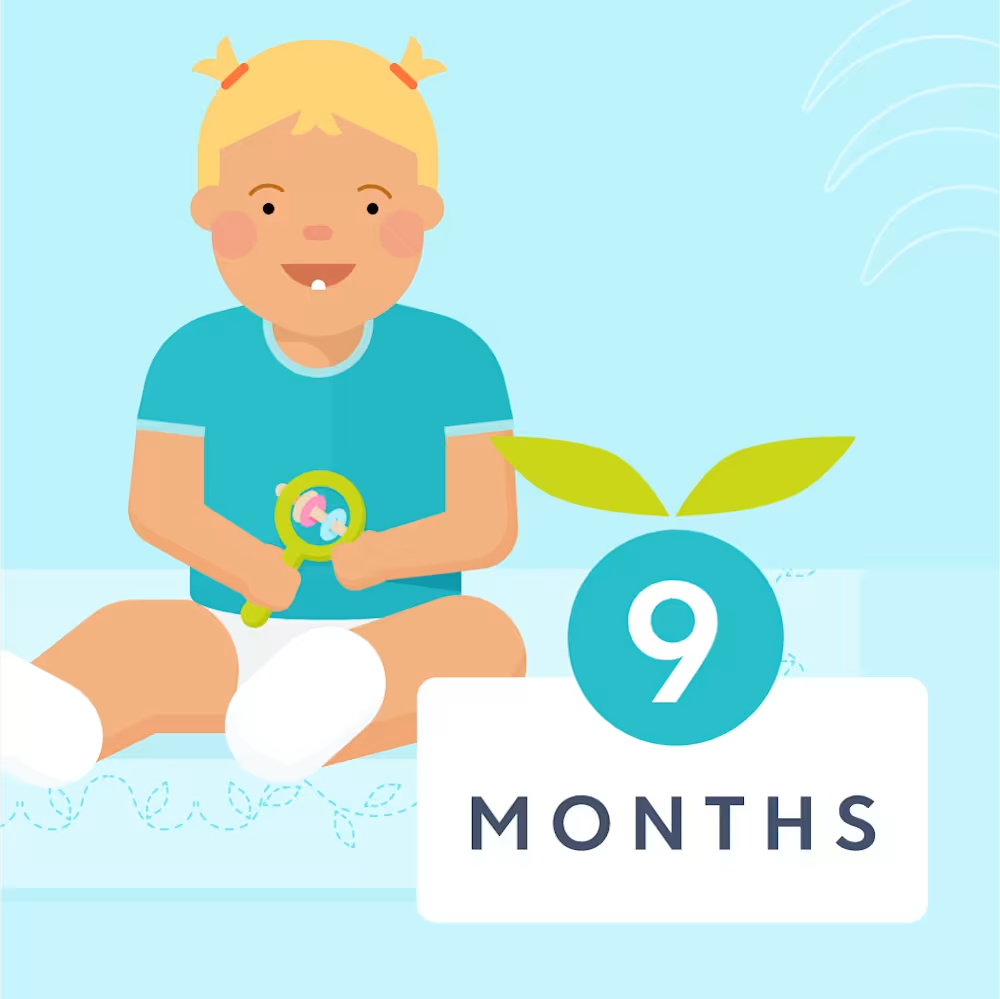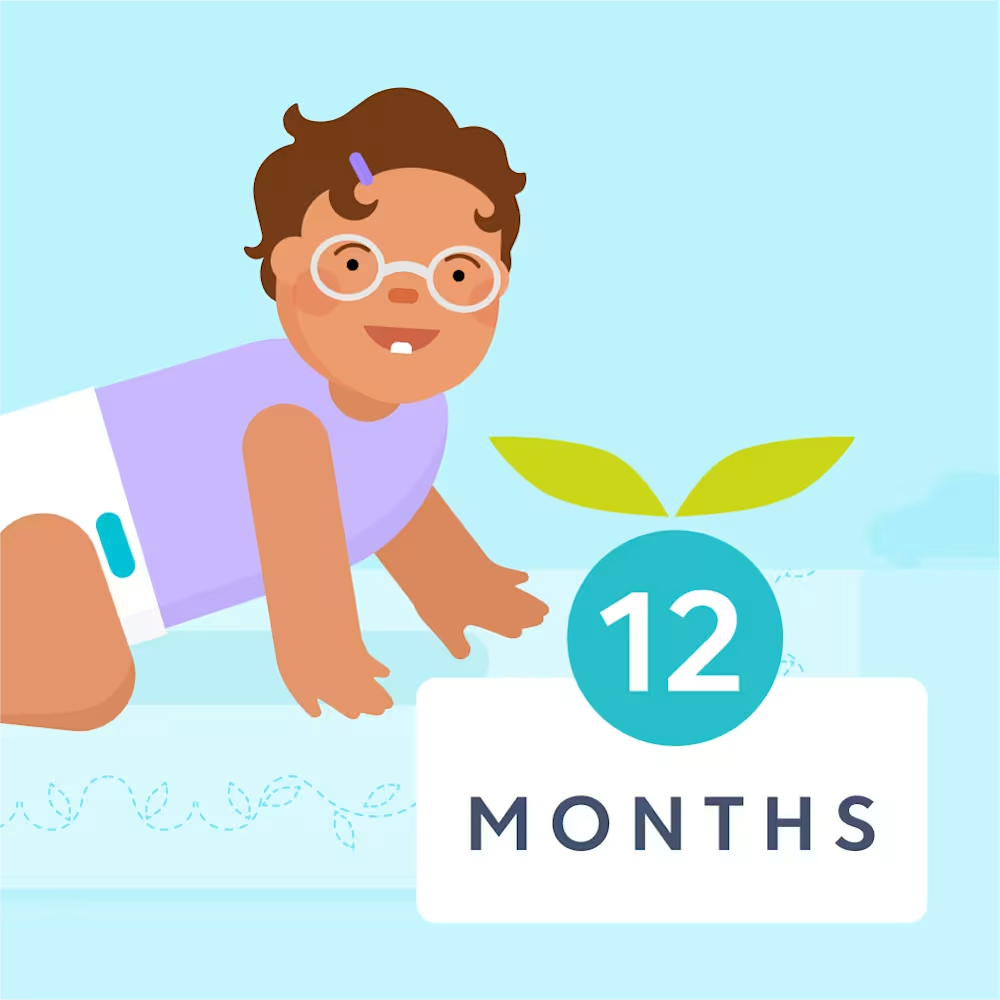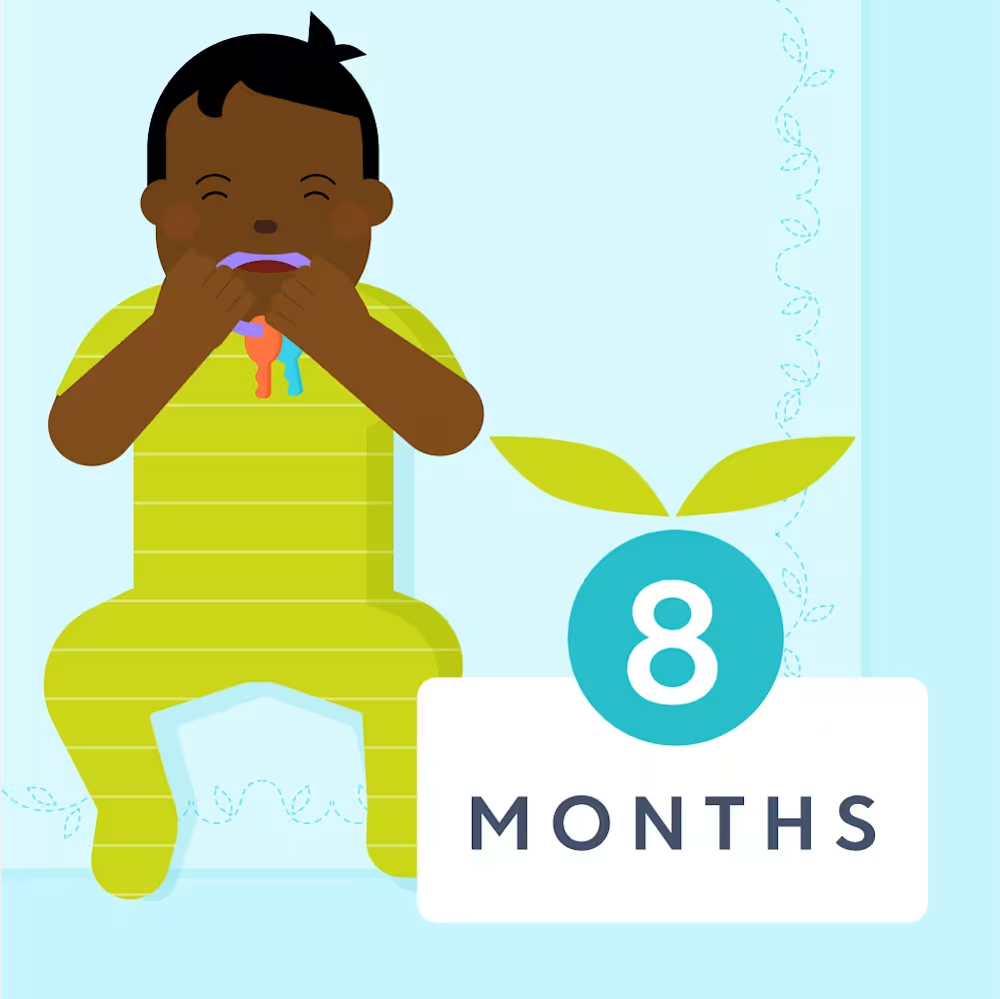10 month old sleep schedule: Bedtime and nap schedule
Updated Dec 15, 2025
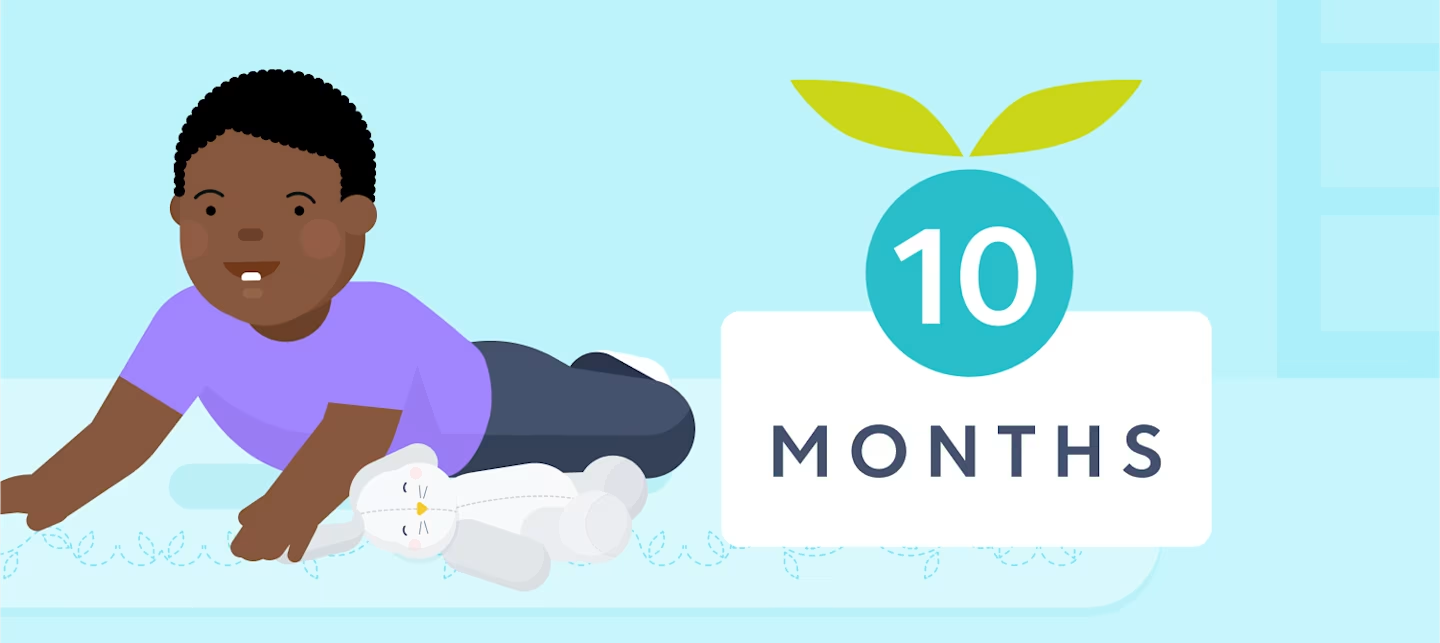
Now that your baby’s likely adjusted to dropping the third nap, it should be much easier for them to handle a 2-nap schedule without getting overtired. This means that with the right foundation, you can expect your baby’s bedtime to become much more predictable, and any night wakings due to temporary overtiredness should be reduced. It’s often also easier to plan activities outside of the home with a more regular “” nap schedule.
In this article, we'll walk you through a typical 10 month sleep schedule, give you suggestions for tackling night waking, and let you know what is normal when it comes to naps at this age.
How much should a 10 month old sleep?
At 10 months old, we recommend aiming for about 13.5 hours of total sleep per day [] (11 - 12 hours at night and 2 - 3 hours of daytime sleep over two naps). Most babies do best with a set schedule which allows for 3 - 3.75 hours of awake time between sleep periods at this age.
Is your baby sleeping a lot more or less than the recommended amount? When it comes to baby sleep needs, it's important to remember that there is range. Don't let the hours keep you up at night. The recommended sleep totals are just a rough estimate — it's equally important to check in on your little one's mood and energy levels to determine whether they're getting the sleep they need.
Here's a quick overview about what at to expect when it comes to wake windows and sleep times at 10 months:
Top sleep tip for 10 month olds
If you’re looking for a more predictable routine, it’s a great time to transition to a set “by the clock” schedule rather than one based primarily on awake time. This means you’ll offer naps and bedtime at about the same time each day, even if your baby wakes a little earlier or later than usual. This helps keep sleep pressure and their circadian rhythm aligned for easier naps and bedtime.
Be sure to target of 3 - 3.75 hours long when planning your baby’s daytime schedule.
Sample 10 month old sleep schedule
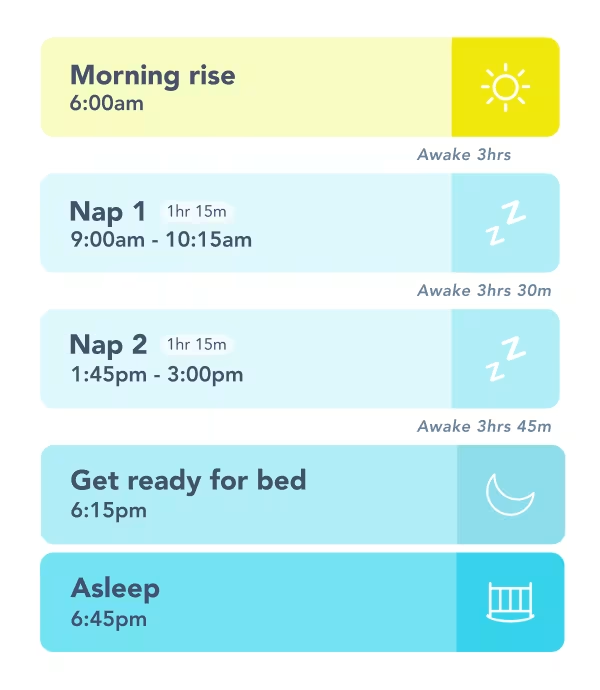
Note: Sleep needs vary by child, and this chart should be viewed as an example.
Morning rise: 6:00 AM
Wake window before first nap: 3 hours
First nap: 9:00 - 10:15 AM (1.25 hour nap)
Wake window before second nap: 3.5 hours
Second nap: 1:45 - 3:00 PM (1.25 hour nap)
Get ready for bed: 6:00 PM
Wake window before bedtime: 3.75 hours
Asleep: 6:45 PM
Naptime schedule for a 10 month old
How long should a 10 month old nap?
A 10 month old’s nap schedule should allow for 2 - 3 hours of daytime sleep. Expect your baby to take two naps each day. Ideally, each will be about 60 - 120 minutes long. Most babies need 3 - 3.75 hours of awake time between naps at this age.
How many naps for a 10 month old?
Plan for a day. The morning nap is usually around 3 hours after waking and the afternoon nap should be offered about 3.5 hours after your baby typically wakes from their first nap.
Here’s an example of what your baby’s day may look like at this age:
2-nap schedule
Bedtime for a 10 month old

What time should a 10 month old go to bed?
Most 10 month olds do best with 11 - 12 hours of sleep at night, so bedtime should be 12 - 13 hours after waking in the morning. That said, some babies nap more than the average 2 - 3 hours during the day. If your baby takes very long naps, or has lower sleep needs, expect that nighttime sleep will be shorter. This is usually okay as long as your baby averages at least 10 hours of sleep each night.
Around this age your baby may be going through developmental changes that contribute to new sleep challenges — like more frequent night waking or resisting and skipping naps. If this is the case, this period of rocky sleep could be referred to as a “.” Night sleep may be shorter during this time.
Is there a sleep regression at 10 months?
Sleep regressions can happen at any age, including 10 months. Increasing mobility and other developmental changes around this time often lead to periods of bumpy sleep. If your baby is experiencing new sleep challenges at this age, you could refer to this period as a “.”
Why does my 10 month old keep waking up at night crying?
If your baby is calling out for you when they wake up overnight, it may be due to things like working on developmental milestones, teething, or illness. Also, if your child is used to receiving help to fall asleep at the beginning of the night, they may call out to you for the same help when they wake up overnight.
If helping your little one to sleep by rocking, patting, or feeding is working for you, there’s nothing wrong with continuing this support. However, sleep associations can lead to frequent night wakes and poor sleep for children and parents. If you’re looking for more sleep support, consider submitting for a personalized Sleep Plan via .
Can my 10 month old sleep with a pacifier?
If your 10 month old sleeps better with a pacifier, feel free to continue offering it to them. However, if your child becomes distraught when the pacifier falls out of their mouth (or crib) overnight and this becomes disruptive to their sleep, now is a great time to work on helping them learn to replace it themselves. Most babies have the hand-eye coordination to do so at this age, it just may take some practice (and placing multiple pacifiers in their sleep space).
Can I sleep train a 10 month old?
Yes, most babies are developmentally ready for sleep training at . There are various to consider, including gradual techniques that take longer and some that tend to prioritize speed and results. There’s no one-size-fits-all and it’s up to you to decide if sleep training is right for your family!
Can a 10 month old sleep on their stomach or side?
At 10 months, the AAP continues to recommend that you place your baby on their back in their sleep space []. However, since your little one can likely move around on their own at this age, it’s OK to let them sleep on their stomach or side if they move positions while sleeping.
What are the developmental milestones for a 10 month old?
Here are some things your may try this month. However, keep in mind that all babies are different and your little one may or may not be working on these things yet.
Sits without support while throwing objects and turning their head
Transitions in and out of various positions to explore and obtain their favorite toys
Pulls to a standing position and cruises along the furniture
Stands independently and may take a few steps with or without help
Uses thumb and pointer finger to pick up tiny objects and is able to release them into a container with a wide opening
Explores objects with curiosity
Imitates sounds and babbles
Engages in simple games like peek-a-boo, patty cake, and banging on musical instruments
Begins to express emotions more distinctly
Responds to your smile with a smile
Does a 10 month old need to eat during the night?
At 10 months, many babies can sleep through the night without eating. However, some may not be able to sleep a full 11 - 12 hours without eating. To help your little one sleep later if they’re waking up hungry, consider offering an early morning bottle or nursing session (usually between 3:00 AM and 5:00 AM) to avoid a very early start to the day. If you have specific questions about your little one’s nutritional needs at 10 months, reach out to their pediatrician or lactation consultant for guidance.
Takeaway
Daily sleep needs: At this age, we recommend around 13.5 of total sleep per day. This typically looks like 11 - 12 hours overnight and 2 - 3 hours of daytime sleep.
Nap schedule: Most 10 month olds are taking two daily naps.
Average wake windows: Kids this age typically need around 3 - 3.75 hours of awake time before needing to sleep again.
Shifting schedules: Now is a great time to transition to a “by-the-clock” schedule rather than one based primarily on awake times. This predictability is often a welcomed change that makes it easier to make plans outside the house and allows for easier naps and bedtimes.
Sleep regression: While predictability is great, around 10 months some babies may go through periods of rocky sleep. Common contributing factors include developmental milestones, teething, and separation anxiety.
If you're curious about what lies ahead in the coming month, glimpse into the future to see what you might experience once your baby is on an . Also check out a to look back on how far your little one has come.
Share article:
Note: The content on this site is for informational purposes only and should not replace medical advice from your doctor, pediatrician, or medical professional. If you have questions or concerns, you should contact a medical professional.
3 Sources
Share article:
